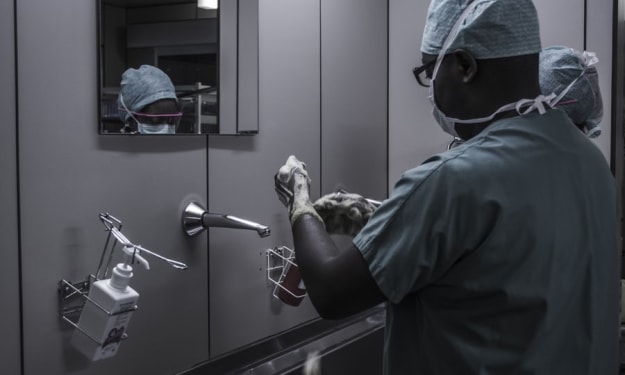Cameras & Skin Cancer - Can They Help, Or Is It Trial & Error?
"Smartphones and cameras are changing skin cancer detection" - James Goydos, M.D.

Although skin is the largest organ of the human body, it is an afterthought for many. For some, the failure to attend to it can mean the difference between life and a death sentence. - James Goydos, M.D.
What a difference a decade makes. One hundred years ago, the thought of fitting an encyclopedia in one's pocket would have been absurd. Today, that 'impossibility' is simply one website of the almost 2 billion available on the Internet today. And most of us carry it, and its net-connected brethren, on veritable pocket-sized super-computers, smartphones. This technology has undoubtedly broadened access to both information and functionality. Today, 'smartphone' and 'mobile phone' are often used interchangeably, but what makes the mobile phone 'smart' is what sets it apart from its predecessor.
Smartphones integrate the previous capabilities of cellular phones with the addition of features more commonly associated with computers. This means more space, more speed, and more utility. Instead of having to carry around a camera and a computer, we now essentially many of the same functionalities all in one. Couple that with cloud computing, and we have very powerful machines indeed. Right in our pockets. This statement is all but insignificant, but is often taken as rote in 2020. In many nations, smartphones are as ubiquitous as the shoes on our feet, though admittedly more useful. Can your shoes help monitor your skin health? No. But your smartphone can.
Incredulous at the notion that the same device that you use to Instagram your vacation photos is also capable of keeping track of your skin? Understandable, but true, nonetheless. The last decade has seen advancements such that what was once relegated to science fiction has become reality. Cameras that were often only found in the homes of amateur or professional photographers now come stock with the purchase of a mobile phone. The memory and storage capabilities that used to take up several rooms of space are either held in small chips in the phone itself, or otherwise deferred to cloud storage. The benefits that have transferred to the consumer with these advancements stretch beyond the technological into other domains, including healthcare. With the aid of technology, patients can be more proactive about understanding and managing their own health. Take skincare, for example. Although skin is the largest organ of the human body, it is an afterthought for many. But for some, the failure to attend to it can mean the difference between life and a death sentence.
Be proactive and take your skin into your own hands. Literally. Monitor your skin at least once a month.
According to the Skin Cancer Foundation, 1 in 5 Americans will develop skin cancer by 70. And the rates of melanoma are on the rise. So what can we, as potential patients, do to manage our health? Be proactive and take your skin into your own hands. Literally. Monitor your skin at least once a month.
There are several tools available that can help you do just that. Of course, the 'low-tech' mirror works great, as does general visual monitoring of your skin to look out for any suspicious changes in texture, shape, and color. Following the ABCDE rule is a great place to start. But considering the fact that you often see yourself every day, it's easy to see why noting small changes from one day to the next can be hard. This is where technology can help. There are many tools that are designed specifically for that task. Simply take a photo of your skin, set yourself up to receive reminders to take another photograph, and you can see the comparisons yourself. Though these types of tools are not meant to diagnose skin cancer or related concerns, they help make the process of monitoring changes easier. This kind of data puts healthcare back in your hands, and can be useful at your next visit to the dermatologist.
Of course, not all skin monitoring applications are created equally. Some are meant to simply aid the process of monitoring suspicious spots, whereas others actively help to identify the nature of the spots themselves. With the aid of artificial intelligence, some tools claim to help identify melanomas with a higher precision and accuracy than the average doctor. While this sounds like a panacea for problematic skin damage, the science isn't quite there yet.
Although there is definitely promise for the use of AI in diagnostics, there is the tricky problem of false positives, false negatives, and other ethical concerns regarding identification and diagnosis. A false positive, which erroneously tells you that suspicious spot is malignant, for example, is cause for concern. Would you prefer that to a false negative, or a "clean bill of skin health", when the reality is that a malignancy was missed? It's a choice most would simply prefer not to make.
Skin cancers are a global problem and require global solutions.
There are many hurdles ahead for the scientific study, regulation, and approval of these types of applications for widespread use. Despite these challenges, there is the potential for these tools to be a great help to the medical field and patients worldwide. At the very least, the data can help us to better understand how benign and malignant skin present themselves in the wider population. Skin cancers are a global problem and require global solutions. Let's hope we can band together to help improve this technology to improve health outcomes for the future.
This article was previoulsy published on Medium.
* * *
About James Goydos, M.D.
James Goydos is an expert in melanoma research and specialist in surgical oncology with an M.D. from Rutgers University. With over 20 years of experience as a Professor, Surgeon, and Clinical Trial Lead, he is a leading expert in his field.
Subscribe to James Goydos' newsletter. Follow me on Loop, Medium, Instagram, Facebook, YouTube, Medika Life, Doximity, Github, Kaggle, Vocal, LinkedIn, Pinterest, and Twitter!
About the Creator
James Goydos, MD
James Goydos MD - Doctor, surgeon & expert on skin cancer. M.D. from Rutgers. Experience as a Professor of Surgery, Surgical Oncologist, & clinical trial leader. Writing on cancer, detction with camera / computer vision and healthcare.






Comments
There are no comments for this story
Be the first to respond and start the conversation.